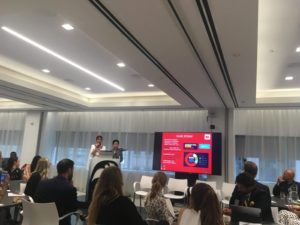It’s easy to think that the world is doomed and that there’s nothing we can do about it. But Camosun College Student Society (CCSS) women’s director Shayan de Luna-Bueno says that it’s important that students understand that they can always make a difference. The CCSS is trying to make a difference right now by integrating the United Nation (UN)’s sustainable development goals into the work it does for students; de Luna-Bueno recently went to the New York High-Level Political Forum, a UN conference in New York where the goals were discussed.
“A lot of what the CCSS does has been already aligned with [UN sustainable development] goal four: quality education,” says de Luna-Bueno.

At the New York forum, de Luna-Bueno was able to talk with Canada’s Sustainable Development Goals Unit.
“The theme of it was intergenerational equity,” says de Luna-Bueno. “A big emphasis was on community engagement in youth, which is already what the CCSS is doing with our student society… Governments and political societies really want to push for more of a youth voice.”
It’s important that, with all the social change happening in the world today, institutions have students at the table while having conversations, says de Luna-Bueno.
“The Canadian government was also looking for more push for student and youth voices as well,” she says.
Whether the issue is quality education, climate justice, or equity, the onus falls on this generation, says de Luna-Bueno.
“Honestly, we wouldn’t be having these conversations if it wasn’t for our previous generations—having to pick up their work, and essentially fix the mistakes,” she says. “Hopefully when we’re pushing for more in the future these things don’t happen again and we don’t have to have these conversations.”
The main thing, says de Luna-Bueno, is actually getting student voices heard.
“A lot of big, high-level organizations or high-level government officials talk about, ‘Oh, yeah, we want to include you, we want to include students,’ and they just… I really want actual meaningful discussions that we’re not tokenized, or that when we are there, it’s accessible to people there,” she says.
The conversations at the forum were full of “big academic political jargon,” says de Luna-Bueno, who found that, because of the language, it wasn’t accessible to everyone. There were discussions at the forum about not leaving people behind, which she found ironic.
“There was all able-bodied people, [and they] were already leaving people behind,” says de Luna-Bueno. “Accessibility is a huge thing for me… It’s so hard to be taken seriously as students.”
The CCSS collaborating with other organizations is key to making politics more accessible for students, says de Luna-Bueno.
“Students need to try to get on the ground as much as you can,” she says. “When we talk about social change, it seems like, for our generation, like it’s the end of the world: ‘Climate change is happening, we can’t do anything, we’re all going to die anyway.’ There is still that opportunity for change. It’s still out there, no matter how serious the situation may be.”
